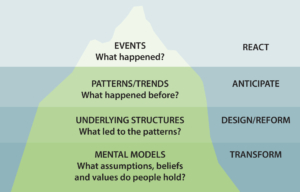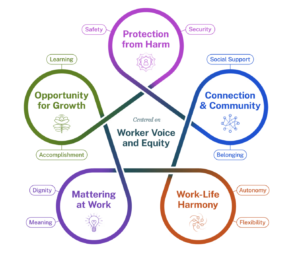A Membership Group for Change Agents

Systems Thinking Model
(Goodman, 2002)
Healthier People & Healthier Organizations
Most of us can sense if our workplace is unhealthy, but it’s much more difficult to know what to do about it. Leading System Change (LSC) was created to help people shift their work systems toward greater health.
The Systems Thinking Model (Goodman, 2002) can help us see where we can intervene in a system to improve its outcomes – healthier people and healthier organizations. Problematic outcomes include employee exhaustion and burnout, talent loss, churn, toxic climates, competitive disadvantage and organizational inertia.
If we want different outcomes and trends, we need to change the structures and mental models that create them. Structures include how we work together, what we ask of each other, how we prioritize and what we act upon. By evolving these we can create healthier workplaces.
Is LSC Right for You?
Wherever you are in your organization, you can help change the way your organization sees work. Employee health can improve, the organization can become more innovative and nimble. Small changes can grow into culture shifts over time. Strategic, modest changes can lead to large scale system change.
We come from a mix of academia and private industry. Our challenges are similar, our experiences diverse, and our discussions are lively and engaging. I’ve taken some of our program conversations back to my team as new thinking to support our work in fostering change and creating an environment that builds trust. I’ve already signed on for 2024!
Elaine, Director, Program Management, Pharmaceutical Development
Program Description
LSC offers models (e.g., Surgeon General’s Framework for Workplace Well-being), strategic approaches and practical advice to support change agents. Because this can be lonely and frustrating work, LSC is also designed to provide community support.
We meet every other Wednesday on Zoom from 1:30-2:30 (Central), January 10 through December 11, 2024. We also have a private LinkedIn group to share resources and ideas between calls.
The fee is $100/month. You can join at any time and end your membership whenever you like.
If you join before February 1, 2024, we offer a discounted annual fee of $1000 for the year. If you’d like to take advantage of the discount, email Katherine and she will send you an invoice. (Note that the annual fee is not prorated. If you decide to cancel before the end of 2024 you will not receive a refund. So if you’re new to our work, we recommend joining with the monthly subscription fee so you can decide if this is a good fit for you.)
If you’d like to learn how to implement health-promoting changes in your organization, join us! To get a feel for how we approach system change, check out our blog posts and free webinar series.
Why Us?
 We created Leading System Change to support change agents like you because we have personal experience about how much energy this work requires.
We created Leading System Change to support change agents like you because we have personal experience about how much energy this work requires.
Katherine has a MS, BS & PhD in Industrial & Systems Engineering, specializing in human factors. Her research focused on how to alleviate occupational stress. She founded and led a faculty development center at the University of Wisconsin-Madison, where she also served as an assistant dean for organizational innovation. She’s worked as a litigation consultant (expert witness) and has led a leadership and organizational development department in industry. Currently, Dr. Sanders consults with organizations about how to improve employee health. She also occasionally teaches job design as adjunct faculty with the Milwaukee School of Engineering.
Patrick is a former professor of mechanical engineering and former provost of Lehigh University and the University of Wisconsin-Madison. While provost, Dr. Farrell developed and implemented initiatives to promote campus inclusivity and innovation. Currently, he is the founding host for Harvard’s COACHE podcast and serves as an academic leadership coach.
Discussion Schedule
LSC’s format is semi-structured. We have concepts to explore together each session and we have the freedom to go deeper into issues that resonate with you.
This year we’ll use Katherine’s Healthy Work Framework to organize our conversations. We’ll also discuss the foundational research of the Surgeon General’s Framework for Workplace Well-Being and implementation opportunities.
Conversation 1: Why a Healthy Workplace is Important
- Ethical and moral perspectives
- Legal perspectives
- Organizational performance
- Organizational agility and sustainability
Conversation 2: Meet People’s Needs
- Understanding what people need from work
- Appreciating what is already in place
- Preserving and expanding what already promotes health
- Considering differing opinions on need imperatives
- Making changes from where you are
- Examples of how to initiate and support change
Conversation 3: Reduce the Risk of Harm
- Understanding what causes harm to people at work
- Acknowledging and prioritizing risk factors
- Discussing risk factors with colleagues
- Looking for opportunities to mitigate risks
- Examples of how to initiate and support change
Conversation 4: Promote Organizational Sustainability
- Commit resources in ways that support engagement, effectiveness and innovation
- Evaluating your sphere of influence
- Requesting support & resources
- Making the change process evidence of a commitment to sustainability
Features and Fees
Members enjoy:
- bi-weekly, 1-hour Zoom discussions on Wednesdays from 1:30-2:30 (Central Time)
- access to a private LinkedIn group to share resources
- connections to change leaders from diverse contexts
- flexibility to engage when you have time, capacity, and desire
- option for a certificate of participation for those who desire professional development documentation
- monthly subscribers have the ability to cancel and rejoin the group at any time*
*NOTE: membership fees are not pro-rated
If you join with a monthly subscription of $100 and decide to cancel mid-month, you will still have access through the current month, but your membership will not renew the following month.


